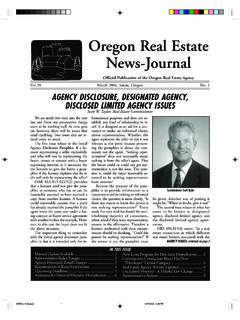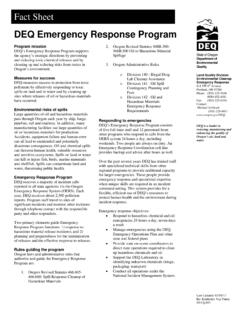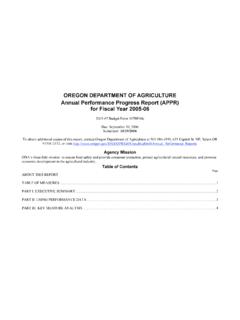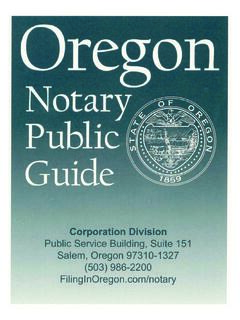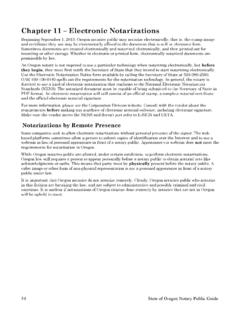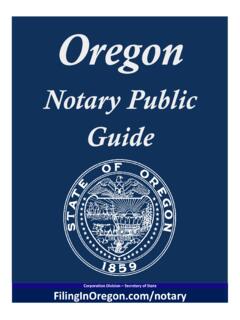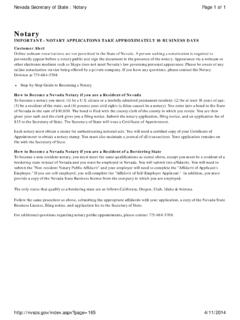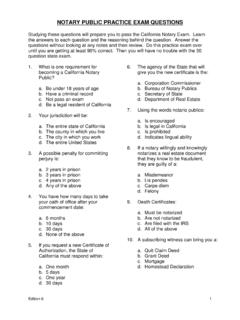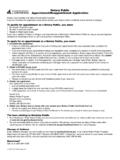Transcription of Oregon
1 Corporation Division Secretary of State Oregon notary public guide Secretary of State - Corporation Division 1 Introduction Thank you for becoming an Oregon notary public , and welcome to the State of Oregon notary public guide . This publication describes the duties and responsibilities involved in carrying out your notarial commission. It covers laws and rules, Attorney General s opinions, state policy, and common sense guidelines based on broad experience and familiarity with case law. Notaries may be held liable for their misconduct in performing notarizations and could be subject to penalties for any misconduct. Penalties can be administrative, criminal, or civil. In addition, a person injured by a violation of any provision of ORS Chapter 194 may bring an individual action in an appropriate court to recover actual damages.
2 It is important that the duties of a notary public be taken seriously. Remember to use care when applying your seal or signature to documents presented before you. One of the fastest growing areas of litigation in the country is actions against notaries for losses caused by improper notarizations. No matter how much this guide covers, it will always miss some situation or special need you and your client may encounter. When these situations arise, contact the Corporation Division, notary section. We recommend that you subscribe to NotaryNews to receive important changes that impact Oregon notaries. Due to budget reductions, the Secretary of State, Corporation Division will no longer use postcards to notify Oregon notaries of important changes in laws and rules. Oregon notaries should subscribe to NotaryNews, our free email subscription service, to receive updates on Oregon notary law, rules and procedures.
3 Secretary of State Corporation Division 255 Capitol St. NE, Ste. 151 Salem, OR 97310-1327 (503) 986-2200 Web: Email: Subscribe to NotaryNews: This is a free email subscription service to receive updates on Oregon notary law, rules and procedures. 2 State of Oregon notary public guide Table of Contents Chapter 1: The notary public .. 4 Notaries in History .. 4 Three Components of a notary public .. 4 Receiving and Maintaining Your notary 5 Commission Renewal .. 6 Non-renewal of Commission .. 6 Loss of notary Seal .. 6 Name Change .. 7 Address Change .. 7 We re Here to Help .. 7 Chapter 2: Responsibilities of Notaries and Employers .. 9 Employer Notarization Policies .. 9 Employers and Notaries .. 10 Chapter 3: Misconduct, Liability & Protecting Yourself .. 12 Misconduct .. 12 Liability.
4 12 Protecting Yourself .. 13 Chapter 4: notary Fees .. 15 Maximum Amount of notary Fees Permitted to be Charged .. 15 Waiver of Fees .. 15 Travel Fee .. 15 notary Fees and Your Employer .. 15 Chapter 5: The notary Journal .. 17 Importance of the Journal .. 17 Disposition of Records .. 17 public Record .. 17 Can an Oregon notary Use ENJOA .. 18 notary Journal Requirements ..19 Abbreviate Multiple Entry in Notarial Journal .. 19 Notarial Acts Not Required to be Recorded in Notarial Journal .. 20 Chapter 6: How to Notarize .. 22 Review the Document .. 22 Identify the Signer .. 22 Determine the Signer s Willingness and Ability to Understand What Is Being Signed .. 24 Secretary of State - Corporation Division 3 Table of Contents Chapter 7: Notarial Certificates .. 26 Components of a Notarial Certificate .. 26 Selecting the Certificate .. 27 Steps to Complete the Notarial Certificate.
5 28 Protect Loose Certificates .. 29 Making Corrections .. 29 Chapter 8: Sample Notarial Certificates .. 31 Acknowledgment Certificate .. 32 Acknowledgment in an Individual Capacity .. 32 Acknowledgment in a Representative Capacity .. 34 Verification Upon Oath or Affirmation Certificate .. 36 Witnessing or Attesting a Signature Certificate .. 38 Copy Certification Certificate .. 40 Attorney-In-Fact Acknowledgment Certificate .. 42 Notarizing a Signature by Mark .. 44 Witness Affidavit for Signature by Mark .. 45 Notarizing for the Blind, Visually Impaired or Disabled .. 48 Chapter 9 - Secretary of State Certificates .. 51 Authentication Certificates .. 51 Certificate of Good Standing .. 51 notary public Notarial Commission Certificate .. 51 Certificate of Authorization To Obtain Official Seal .. 51 Chapter 10: Foreign Language Documents .. 52 Foreign Language Certificates .. 52 Blank Sample Certificates.
6 53 - 54 Glossary of Notarial Terms .. 55 Oregon Revised Statues, Chapter 194 .. 57 Oregon Administrative Rules, Chapter 160 .. 57 Index .. 58 - 59 Review .. 60 4 State of Oregon notary public guide Chapter 1 The notary public A notary is a person of proven integrity appointed by the state to act as an impartial witness (National notary Association Home Study Course). The main function of the notary is to witness a legal proceeding so that the courts and other interested parties can be certain that the person signing a document knows what is being signed, is able to understand the action taken, and is in fact the person whose signature is on the document. Notaries in History In the old Roman Republic, notarii were public secretaries who were shorthand writers. As scribes became more and more common, they developed a service in the public marketplace to draw up legal documents and other written instruments.
7 Wax seals were used as signatures on documents. Later, ribbons tied together multi-page documents, and wax seals on the knots showed that no one had tampered with the knots. Thus, we came to have notary seals. Eventually, the state came to regulate and commission these scribes. Witnesses to the drafting of their documents came to be required. Notaries, still in the public marketplace, evolved into both drafters and witnesses to these writings. As notarii became essential to commerce and law, royalty found the need to commission and employ them for drawing up and countersigning documents. By the Middle Ages, notaries had to undergo formal training and examinations. Gradually, the government took over sole appointment of notaries, giving them public officer status. In Europe, Africa, Asia, and Latin American countries, notaries retain many of their attorney-like powers. In the United States, however, notaries are most important for merely witnessing documents drafted by someone else.
8 This disparity in notary authority is the reason Oregon has a law against advertising as a Notario Publico , which conveys to Spanish-speaking individuals vastly different powers than notaries have in this state. A person may not use the term notario publico or any equivalent non-English term, in any business card, advertisement, notice, sign or in any other manner that misrepresents the authority of a notary public . ORS (5). Even within the United States, the duties and responsibilities of a notary public vary greatly from state to state. Oregon law states A notary may not make representations to have powers, qualifications, rights or privileges that the office of notary does not have including the power to counsel on immigration matters. ORS (2). It is essential, therefore, to become familiar with Oregon s notary laws and rules even if you have previously served as a notary in another state.
9 Three Components of a notary public There are three components to the notary public . He or she must be of proven integrity, an officer of the state, and an impartial witness to a particular transaction. Proven Integrity Because a notary s whole purpose is to detect and deter fraud, Oregon statutes require notaries to be of good moral character. If a person has been convicted of embezzlement or fraud, he or she is not considered to be of good moral character. A traffic violation such as a speeding ticket, however, isn t relevant to notarial functions and wouldn t disqualify one from obtaining a notarial commission..the Department of State Police shall furnish to the Secretary of State any information that the department may have in its possession from its central bureau of criminal ORS (1). Ministerial Officer of the State A notary public is commissioned by the state and acts as an officer of the state.
10 Because the office is ministerial rather than regulatory or judicial, the duties of the office are narrowly defined to certain prescribed acts of limited scope. A notary must follow written rules that allow only limited discretion in performing these acts. A notary needs to remember that they have become a State of Oregon notary , not their employer s notary . Secretary of State - Corporation Division 5 Impartial Witness The main function of the notary is to witness a legal proceeding. As a witness, the notary must ensure the willingness, competence, and identity of the signer. The notary does not validate or legalize the document or guarantee its truth. It is important to the validity of the witnessed act that the notary be impartial. Impartial means: The notary has no financial interest or any other beneficial interest in the transaction. The notary has nothing to gain by notarizing. Otherwise, suspicion of fraud is thrown upon the whole proceeding.
